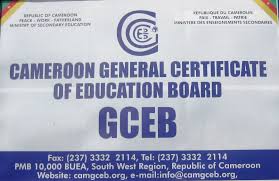- Ayah Paul, others pick hole on success rate
- Controversial Social Media Release
- Detailed Statistics & Analysis
BY NDIMUH B. SHANCHO
The 11.9 percent increase in success rate registered by the 2019 results of the Cameroon General Certificate of Education (GCE), published last July 29, has begun receiving punches from Cameroonians across the country. With the arm-conflict rocking North West and South West Regions of Cameroon, considered the cradle of the Anglo-Saxon education, and the Anglophone crisis that has completely paralyzed schools in these regions, they find it hard to believe that the success rate of the 2019 GCE has instead increased.

“Even in normal times since the London GCE, the kind of easy astronomical success rate in GCE this year has been unattainable year in year out. In times of war when students have little peace of mind; scarce conducive study environment; little available food; overcrowded classrooms in foreign lands; and the rest of similar oddities, it is IMPOSSIBLE that the success rate should go up to, let alone above, 70%. Not to talk of the generous gifts in the number of papers obtained per student and the rocket points!” Ayah Paul Abine, Former Supreme Court Attorney reacted on his face book page in a write up titled; “VERY LIKE POLITICAL GCE”
Though the results represent the entire country and not only North West and South West regions, Douala-based journalist, Meme Dominick, cannot fathom how the two regions that produce more than half of the number of candidates can be without effective schooling, yet there is a remarkable increase in success rate. “It’s common knowledge that the two Anglophone regions usually produce more than half of the candidates of both Ordinary and Advanced levels examinations. Going by this, the 11.97 % improvement in the results as compared to last year is a clear indication that the two restive regions performed well in the exams. That for me is not logical,” he stated.
This line of thought is also shared by a Dschang resident, Tengem Adeline, who quipped that “the rate at which people passed the GCE this year, I am sure if my mother wrote she too would have made it”.
Most of those with this shade of opinion hold that the success rate was trumped-up to either encourage parents to send their children to school next academic year or to give the impression that normalcy is returning to the North West and South West regions.
“One is highly tempted to opine that the results stem from political scheming intended to deceive that the situation is returning to normal. Another way of putting it is that standards have been lowered as the success threshold for political gains!” Ayah Paul wrote.
To Meme Dominic, “I still think the results have been tailored to encourage children in the conflict regions to go to school this September even in an unstable atmosphere”.
Speaking on state radio shortly after GCE release, the National President of the Parent Teachers Association of the English Subsystem of Education, Peter Ndikum said “even if the percentage says we are on the rise, in 2016 we had more than 184,000 who sat the exam. In 2019, we were expecting to have more than 200,000 to seat for the GCE O/AL but we hard only 98,015, who sat for the exam. So, we are less than a hundred percent. North West and South West, in an Anglo-Saxon examination presenting less than 10% of the result? even though in term of quality the best comes from Bamenda even that first 6 candidates on honour roll at St Benoit in Yaounde are displaced persons from North West and South West”
There are, however, other Cameroonians who attribute the increase in performance rate to the migration of students to safer parts of the country and the fact that students in the North West and South West regions are already adapting to their plight.
A Bamenda-based student, who preferred to simply be referred to as Paul, said “I didn’t go to school last year because of the crisis. When this academic year started, my father sent me to Yaunde where I lived with my Aunt, studied hard and made it. While in Yaounde, I made other friends from Bamenda, who also ran away because of the crisis. So I can say the success rate increased this year because many of us studied in safer zones”.
Meanwhile, the Minister of Secondary Education, Nalova Lyonga congratulated “all stakeholders” for organizing a hitch-free examination, while announcing the release of GCE, Monday July 29, 2019.
Controversial Social Media GCE Release
Unlike previous years when the release of GCE results were first announced by the national station and then published in booklets and or handed to telephone companies where students paid to check their names, the release of GCE this year shocked even top administrators of the GCE Board. Cameroonians had gotten up early in the morning of July 29, 2019 with a PDF version of the 2019 GCE results on WhatsApp. Many initially considered it as fake, just like one, which was circulated a few days before then. Some even justified that “GCE is always released in the afternoon and not morning”. It was until they started seeing names of those who sat in the 2019 session of the examination that they believed it wasn’t a fake GCE result this time around. Some journalists in their quest for credibility, trooped to the GCE Board in Buea but top administrators were even more shocked than the journalists. How the GCE results got to the social media before official release, is a question still begging for answers.
Detailed Statistics & Analysis
Statistics indicate that 110,916 candidates registered for the GCE but only 98,015 wrote and 66,846 passed given a success rate of 74.24&, 11.9 percent up from the 62.27 percent in 2016.
For the GCE Ordinary Level General examination, 67,936 candidates registered, 58,759 sat for the exams and 36,517 passed, giving a percentage pass of 62.15 as opposed to 50 percent last year. At the Advanced Level General, 31,716 registered , 31,182 candidates wrote and 24,434 were successful, scoring 78.36 per cent as compared to 67.5 last year.
The results further reveal that 4723 registered for Ordinary Level Technical, 4,440 candidates wrote and 2,782 were successful, scoring 67.14 per cent up from 58.2 in 2018. Out of the 3676, who registered for Advanced level technical examination, 3,634 wrote and 3,113 passed witnessing an improvement from 73.4 per cent last year to 89.34 per cent this year.
Results further indicate that 37 candidates at the GCE Advanced level obtained 25 points with Biology registering the highest number of “A” grades at the GCE Advanced Level. The best GCE Advanced Level student, Teboh Tessy Abong, is from Our Lady of Lourdes Secondary School Mankon in Bamenda, followed by Sokamte Holland from Government Bilingual High School Yaounde and Agogho Philippe from Saint Benedict College Mvolye in Yaounde.
Meanwhile, 25 candidates that wrote GCE Ordinary Level obtained 33 points. The first three best outstanding candidates at the GCE Ordinary Level are all girls; Jani Vanelle Lekuna from Our Lady of Lourdes Secondary School Mankon; Minoue Johana Emmanuelle and Mindjimba Annaelle Loicia Daphne from the Laval Bilingual College in Makepe Douala. The most outstanding candidate at the GCE Advanced Level Technical is Mukah Nereus Azah from Inter Comprehensive College Great Soppo, with 25 points. He was followed by Ngum Promise Bajong and Anghie Vanity Nguoh, both Yaounde external candidates.






